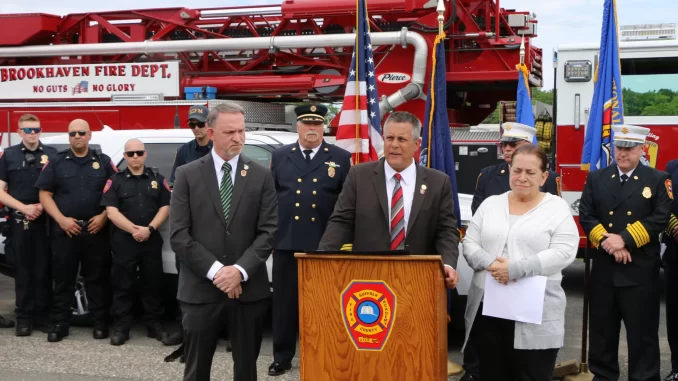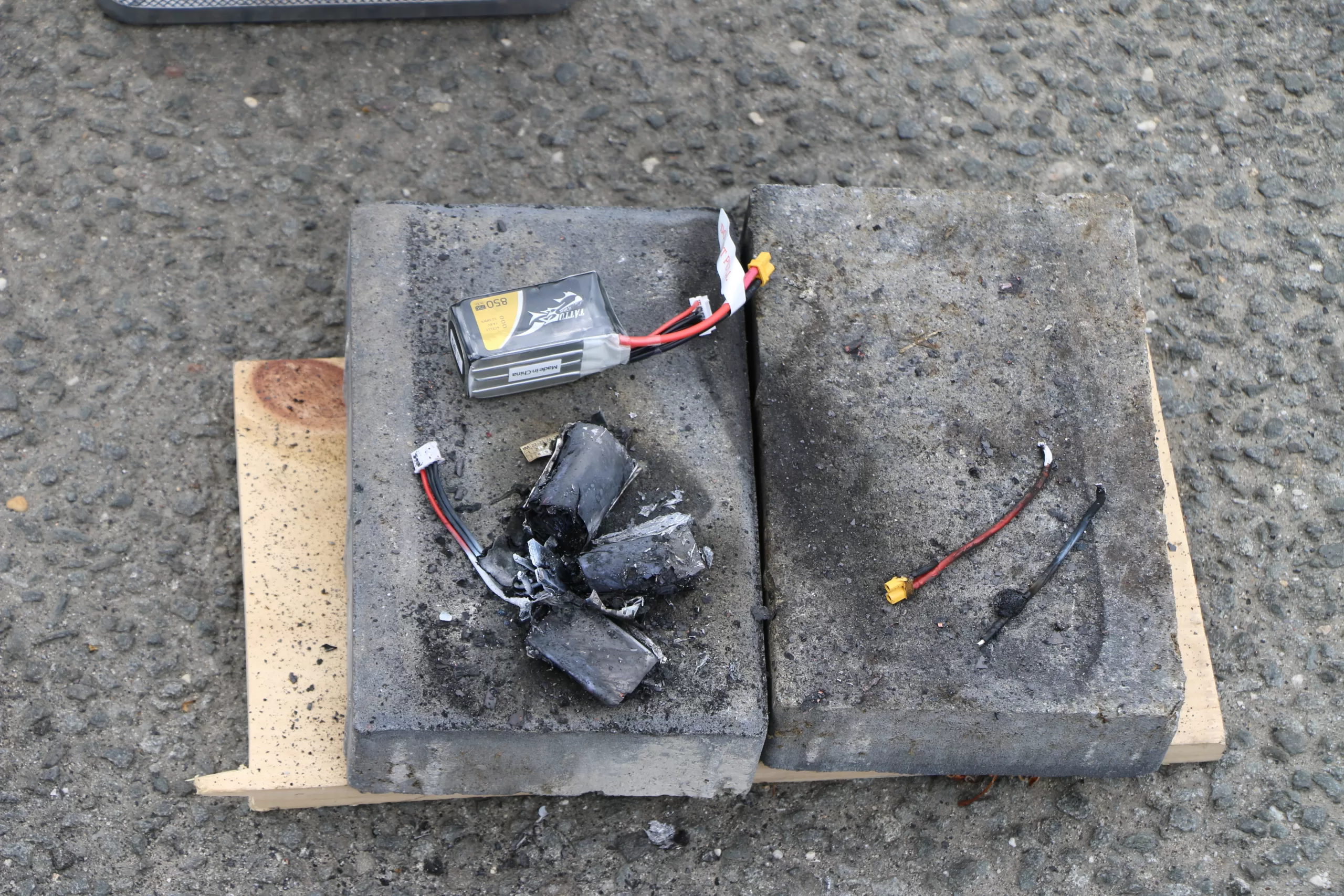
By Hank Russell
Suffolk County Legislator Dominick Thorne (R-Patchogue) was joined by fellow Legislator Leslie Kennedy (R-Hauppauge), local fire chiefs and members of the Suffolk County Fire Rescue and Emergency Services (FRES) at the Suffolk County Fire Academy on June 7 to announce that Resolution 1230, which entails the enforcement of the sale of lithium-ion storage batteries, passed the Legislature. It is currently awaiting the county executive’s signature.
“This is a bill, not of politics, but of people,” Thorne told the crowd. “Public safety remains my number one priority and we are acting in the face of a clear danger before a single Suffolk County fatality has occurred as a result of potential lithium-ion tragedies – as they already have in the tri-state area.”
“This bill is essential,” Kennedy said. “This bill will save hundreds of thousands of lives. We are blessed to have this.”
“I applaud Legislator Thorne for his foresight in introducing this legislation,” Suffolk County Executive Ed Romaine said in a statement. “As a longtime first responder, he understands the potential dangers to the men and women of our local EMS and fire departments and most especially the community. I look forward to signing this measure into law as soon as it hits my desk.”
On June 4, the Legislature passed this bill, which makes it illegal to sell lithium-ion storage batteries that are not certified by a Nationally Recognized Testing Laboratory (NRTL), such as Underwriters Laboratories (UL). Such certification must either be displayed on the packaging, or in a document that will accompany the product. This would apply to storage batteries used for electric assist bicycles, powered mobility devices and other battery-powered devices.
In addition, it gives not just the Suffolk County Police Department the authority to enforce this law, but the county fire marshal, town and village police departments and local code enforcement officers as well. Those who knowingly sell an uncertified battery will be fined $1,000 for the first violation and $2,000 after each subsequent violation.
Thorne pointed out that most of these faulty batteries come from overseas and are sold cheaply. “You may see one of these batteries for $5 and think, ‘What a deal,'” he said. “However, these batteries can ignite and you can lose everything — your family, your house, your loved ones, your neighbors.”
“According to the U.S. Fire Administration, on average there are more than 1.2 million structure fires, nearly 3,000 deaths, thousands of injuries, and scores of individuals displaced annually due to fires. In 2023, the FDNY alone reported 268 fires involving lithium-ion batteries, 150 injuries and 18 deaths.
In 2021, the Suffolk County Fire Academy offered its first L-ion Battery Training Program for Firefighters. Since then, said Suffolk County Fire Academy Executive Director Scott W. Davonski, the Academy has trained over 1,600 firefighters on the dangers and response to L-ion battery fires. “Thank you to Legislator Thorne and the members of the legislature for your support of the
Suffolk County Fire Academy and for passing this life and property-saving local law,” he said. “I would also like to thank the members of the Suffolk County Lithium-Ion task force for their work educating the public about the potential ha

zards of L-ion batteries.”
Joseph Fagan, president of the Fire Marshals Association of Suffolk County, added, “While the proliferation of lithium-ion battery technology and electric mobility devices brings about numerous benefits, it also introduces significant safety concerns. No party knows these concerns better than the fire service, be it the firefighter who struggles to extinguish a battery fire, a fire inspector who observes unsafe battery storage in a building, or a fire investigator who must investigate and document the damage caused by a fire.”
After the press conference, Randy D’Arcy of Envista Forensics provided a demonstration showing what happens when a faulty lithium-ion battery catches fire. D’Arcy said the battery was “self-limiting,” meaning there was nothing around the battery that would catch fire, “but if this was underneath your pillow, next to your couch, in your garage with your flammable liquids … it could spread to that.”
Long Island Life & Politics asked D’Arcy how a fire ignites in one of these batteries. “there is an anode and a cathode, with a member in the middle,” he said. The member keeps the anode and cathode separate, but when the member wears down, “That’s when [the fire] starts.”
Dr. Donald G. Lynch, Suffolk FRES’ chief fire marshal, added, “It is said that the best fire is the one that doesn’t happen. This legislation put forth by Legislator Thorne goes a long way in helping to prevent these fires from happening. The assurance that Lithium-Ion products sold in Suffolk County are approved by a certified testing lab is a major step in protecting the public.”

